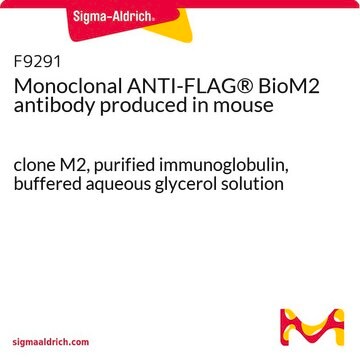F2922
Monoclonal Anti-FLAG® BioM5−Biotin antibody produced in mouse
clone M5, purified immunoglobulin, buffered aqueous solution
About This Item
Productos recomendados
biological source
mouse
conjugate
biotin conjugate
antibody form
purified immunoglobulin
antibody product type
primary antibodies
clone
M5, monoclonal
form
buffered aqueous solution
technique(s)
western blot (chemiluminescent): 2 μg/mL
isotype
IgG1
shipped in
dry ice
storage temp.
−20°C
General description
Application
The product binds the FLAG peptide only when it is located at the amino terminus preceded by a methionine. Binding is not Ca2+-dependent. It is useful for detecting cytoplasmically expressed Met-FLAG® fusion proteins in mammalian crude cell extracts, but not recommended for fusion proteins expressed in E. coli.
It can be used for immunodetection methods using avidin- or streptavidin-conjugated reporter enzymes such as streptavidin-peroxidase. Primary antibody conjugates are preferred when using murine cells as the recombinant protein host.
Browse additional application references in our FLAG® Literature portal.
Features and Benefits
Physical form
Legal Information
¿No encuentra el producto adecuado?
Pruebe nuestro Herramienta de selección de productos.
Storage Class
12 - Non Combustible Liquids
wgk_germany
WGK 3
flash_point_f
Not applicable
flash_point_c
Not applicable
Certificados de análisis (COA)
Busque Certificados de análisis (COA) introduciendo el número de lote del producto. Los números de lote se encuentran en la etiqueta del producto después de las palabras «Lot» o «Batch»
¿Ya tiene este producto?
Encuentre la documentación para los productos que ha comprado recientemente en la Biblioteca de documentos.
Nuestro equipo de científicos tiene experiencia en todas las áreas de investigación: Ciencias de la vida, Ciencia de los materiales, Síntesis química, Cromatografía, Analítica y muchas otras.
Póngase en contacto con el Servicio técnico








